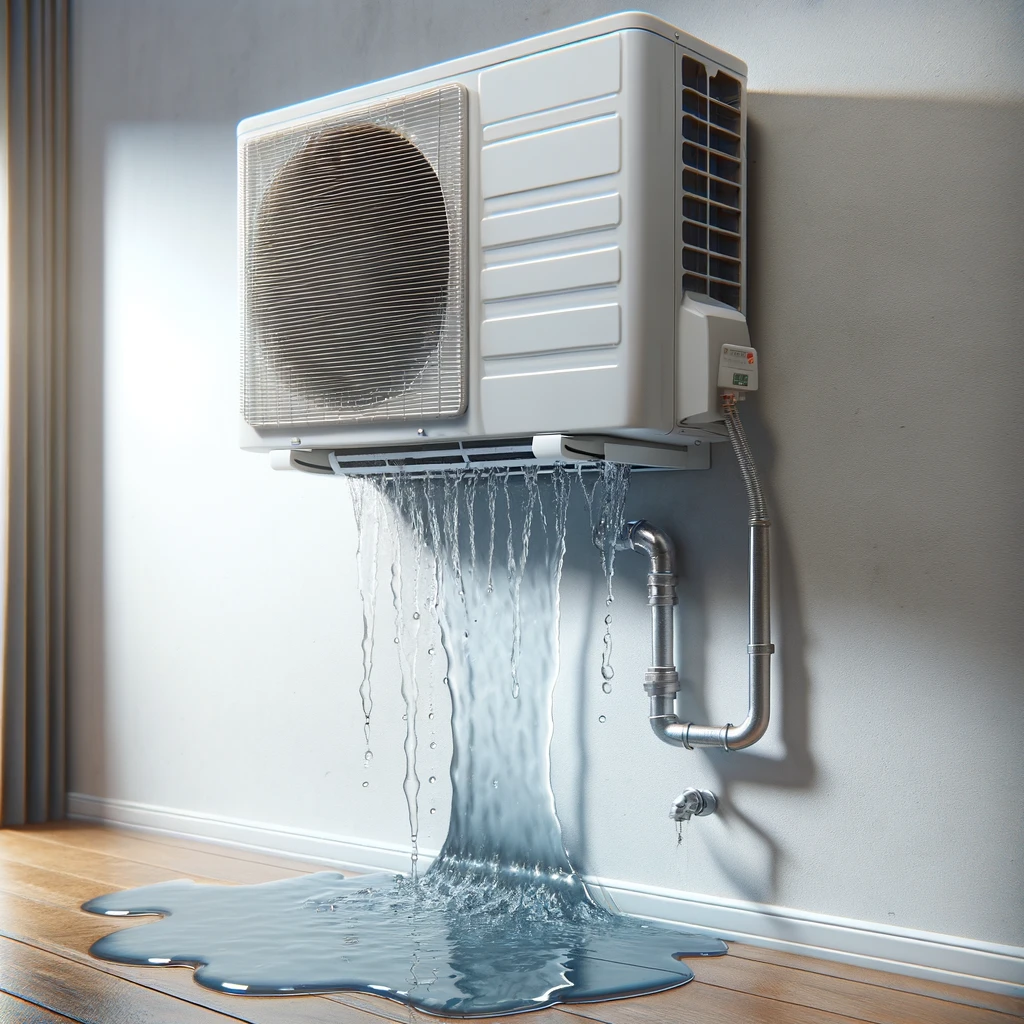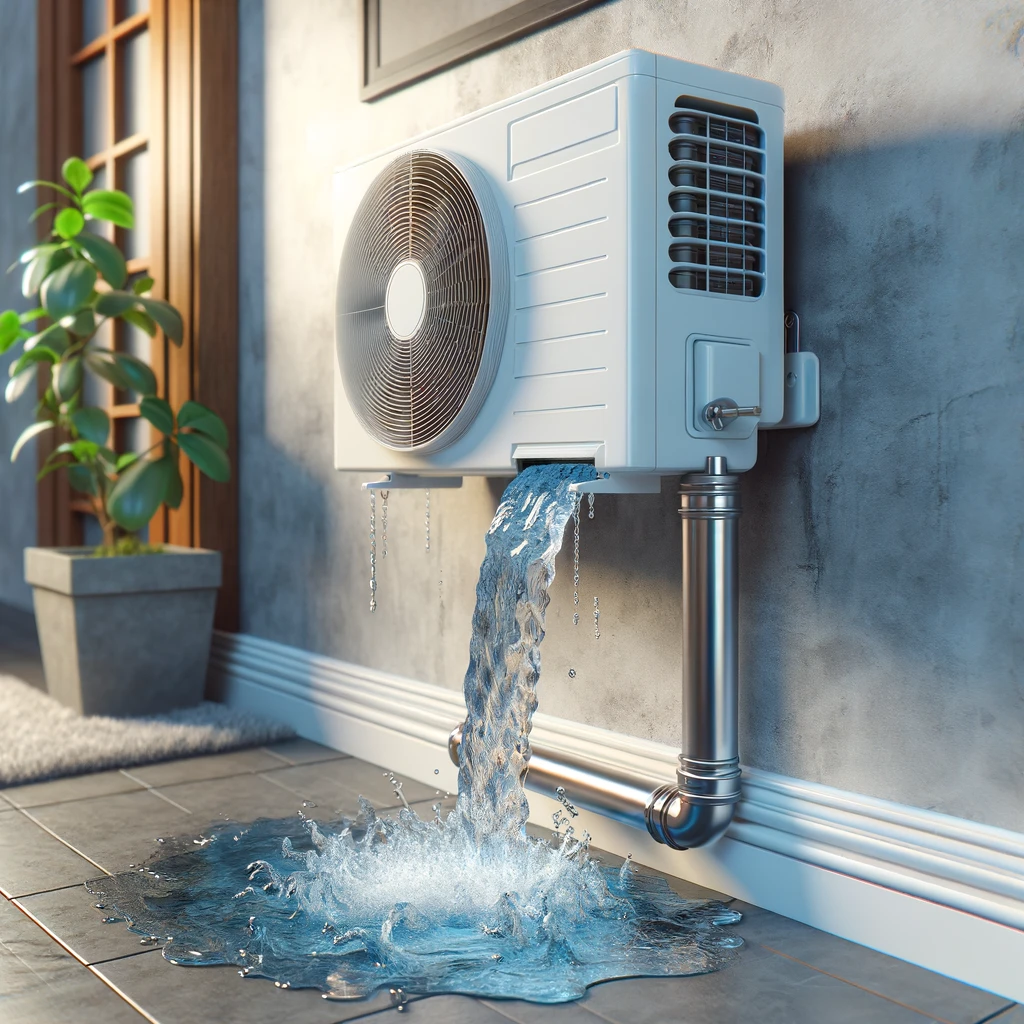AC dripping water inside units is a common problem with various possible causes. While some causes may be minor and easily remedied, others could indicate more significant problems that require professional attention. Ignoring the issue could lead to further damage to your AC system and potentially even water damage to your home.
In this article, we’ll explore the possible reasons why AC dripping water inside the apartment and discuss when you should be concerned and take action immediately.
Table of Contents
ToggleWhy Is My AC Dripping Water Inside The Apartment, And How Do I Fix It?

An AC dripping water inside the house can be attributed to several factors, ranging from minor to more severe concerns. Here are some common reasons why your AC might be leaking water and their corresponding solutions –
Clogged Condensate Drain Line
Over time, dirt, dust, and debris can accumulate in the condensate drain line, causing it to become clogged. When this happens, water can go back into the AC unit and leak.
Solution: Clean the condensate drain line using a wet/dry vacuum or a mixture of vinegar and water to remove blockages and restore proper drainage.
Dirty Or Clogged Air Filter
A dirty or clogged air filter can restrict airflow over the evaporator coils, causing them to freeze and eventually thaw, resulting in water leakage.
Solution: Replace the air filter regularly every 1-3 months to ensure proper airflow and prevent ice formation on the coils.
Faulty Condensate Pump
If your AC unit is in a basement or below-grade area, it may rely on a condensate pump to remove water. If the pump malfunctions, water can accumulate and overflow.
Solution: Inspect the condensate pump for any signs of damage or malfunction and repair or replace it as needed.
Low Refrigerant Levels
Low refrigerant levels can cause the evaporator coils to freeze, leading to water dripping from AC Indoor Unit leakage when they thaw.
Solution: Have a qualified HVAC technician inspect your system for leaks and recharge the refrigerant if necessary.
Improper Installation
Improperly installing or sizing the AC unit can lead to drainage and water leakage issues.
Solution: Consult a professional HVAC technician to ensure your AC unit is installed correctly and sized for your home.
Taking care of these common AC issues promptly will prevent water leaks and keep your AC running efficiently and comfortably throughout the summer.
What Are The Dangers Of AC Dripping Water Inside Your HVAC?
AC dripping water inside can pose several dangers if left unaddressed, potentially leading to costly damage and health risks. Here are the dangers associated with water leakage from your HVAC –
- Water Damage To Property: One of the most immediate dangers of HVAC water leakage is the risk of water damage to your property. Water can seep into walls, ceilings, and floors, causing structural damage, mould growth, and deterioration of building materials. Over time, this can weaken the structural integrity of your home and necessitate costly repairs.
- Mould And Mildew Growth: Excess moisture from HVAC water leakage creates ideal mould and mildew growth conditions. Mold spores can increase rapidly in damp environments, leading to widespread home contamination. Mold exposure can exacerbate allergies and respiratory conditions and pose serious health risks, particularly for individuals with weakened immune systems.
- Electrical Hazards: Water leakage from your HVAC system can create electrical hazards if it comes into contact with electrical components or wiring. This poses a risk of short circuits, electrical fires, and electrocution. It’s crucial to shut off power to the affected area and contact a qualified HVAC technician to address the issue safely.
- Reduced Indoor Air Quality: Water dripping from the AC Indoor Unit can compromise indoor air quality by promoting mould growth and spreading airborne contaminants throughout your home. Mold spores, bacteria, and other allergens can exacerbate respiratory issues, trigger asthma attacks, and cause discomfort for occupants. Maintaining a dry, clean environment is essential for preserving indoor air quality and protecting your health.
- HVAC System Malfunction: Water leakage can damage vital components of your HVAC system, such as the evaporator coils, blower motor, and electrical connections. This can result in reduced system efficiency, increased energy consumption, and premature system failure. Regular maintenance and prompt repairs are essential for preserving the longevity and performance of your HVAC system.
How Should You Handle AC Dripping Water Inside In An AC Unit?

AC dripping water inside can be alarming, but you can address the issue promptly and prevent further damage by knowing what to do.
Here’s a step-by-step guide on how to fix an air conditioner leaking water inside and what to do in such a situation-
Turn Off The AC
If you notice water leakage from your AC unit, the first step is to turn off the system immediately. This will prevent further water damage and reduce the risk of electrical hazards.
Inspect The Area
Carefully examine the area around the AC unit to assess the extent of the water leakage. Check for any signs of water damage to walls, ceilings, floors, or nearby furnishings.
Locate The Source Of The Leak
Determine where the water is coming from to identify the underlying cause of the leakage. Familiar sources of AC water leaks include clogged drain lines, dirty air filters, faulty condensate pumps, low refrigerant levels, or improper installation.
Clear The Condensate Drain Line
If the condensate drain line is clogged, use a wet/dry vacuum or vinegar and water to clear the blockage. This will allow water to drain correctly and prevent it from backing into the AC unit.
Replace The Air Filter
If a dirty or clogged air filter is causing the water leak, replace it with a clean filter. This will improve airflow over the evaporator coils and prevent them from freezing and thawing, which can lead to water leakage.
Check The Condensate Pump
Inspect the condensate pump for any signs of damage or malfunction. If the pump is not working correctly, it may need to be repaired or replaced to restore proper drainage.
Inspect Refrigerant Levels
Low refrigerant levels can cause the evaporator coils to freeze, resulting in water leakage when they thaw. Have a qualified HVAC technician inspect your system for leaks and recharge the refrigerant if necessary.
Following these steps, you can effectively address water dripping from the AC indoor unit and prevent further damage to your home and HVAC system. Remember to prioritize safety and consult a professional if you need help with how to proceed.
FAQ About AC Dripping Water Inside
Do All AC Units Drip Water?
Yes, all air conditioning units produce condensation as a byproduct of the cooling process, which typically drips water. However, excessive dripping may indicate a problem that requires attention.
How Long Will AC Last With A Leak?
The lifespan of an AC unit with a leak can vary depending on factors such as the severity of the leak and how promptly it’s addressed, but it may lead to premature failure.
Don’t Delay: Fix Your AC Dripping Water Inside AC Unit Today!
If your AC dripping water inside, don’t ignore it! Contact a professional HVAC technician to diagnose and repair the issue promptly. Ignoring water leaks can lead to costly damage and potential health risks. Ensure your home stays comfortable and safe with professional AC maintenance today. Call Us today at (713)-598-2737 to schedule an appointment.
